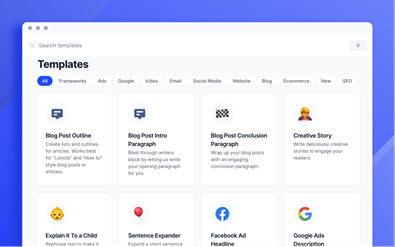Content marketers spend a lot of time pondering the question, “Will copywriters be replaced by AI?” They often conclude writers don’t need to worry.
But you would benefit more if you asked a different question: “How can content writers work in a world that includes AI-created content?”
Take steps today to ensure your work and skills can’t be replaced by a robot:
1. Learn how to use AI tools to write better content
AI-based creation-related tools can be a real asset for content marketers who know how to use them to their advantage. They range from writing functional, well-optimized content to boosting its development by completing tasks like writing meta descriptions and social media copy.
Here are a few AI tools to enhance your content creation process:
- Grammarly uses AI to identify language that’s awkward, stilted, or unnatural in addition to its standard proofreading review.
- Can I Rank? is our AI-powered martech tool that validates content ideas with keyword research or suggests other possibilities to help a page rank.
- AI automates the process of producing clean and well-optimized content. It has a library of AI templates based on common copywriting formulas like attention, interest, desire, action (AIDA), and problem-agitate-solution.
- Jarvis uses AI-powered templates to generate content, automating and optimizing your headlines and social media copy.

imagesource
2. Train in content promotion strategies
You’re not just a content writer; you’re a marketer. That means you should know how to promote content as well as write it. That right there puts you a step above any AI writing program.
Promoting content requires an intimate understanding of your space, the audience’s pain points, and how your content and brand products address those challenges. Promotion really encompasses much of the same knowledge required for effective content creation.
Future-proof your #ContentMarketing career: Use the knowledge for great creation to do great promotion, says @AmAVagabond via @CMIContent. Click To Tweet
It’s a good idea to brush up on your content promotion skills by learning more:
- Link building is the practice of securing the inclusion of links to your content from reputable third-party sites to boost your site’s keyword rankings. It requires you to interact with editors and publishers and persuade them to link back to your content.
- content syndication is the practice of republishing your content on platforms like Medium through content aggregators to boost the reach of your content. To do this well, you must be familiar with the online spaces where your target audience hangs out and know how to make your content visible in those spaces.
- social media marketing involves the paid and unpaid promotion of your content, products, and services on Facebook, Instagram, Twitter, etc. It requires knowing which hashtags to use and which groups will be receptive to your content, so it gets the most likes, comments, shares , and ultimately traffic.
- Search engine marketing goes hand in hand with search engine optimization. Know how to build pay-per-click advertising campaigns to target your keywords.
ADVERTISEMENT
The Enterprise Marketer’s Content Creation Guide: A framework for developing content that attracts, engages, and converts
Elevate your content marketing creation with this 3-part framework based on our experience producing 100,000+ pieces of content. Perfect for enterprise marketers ready to scale. Download the e-book today.
3. Become a specialist
It’s common career advice for content writers to focus on a niche or vertical as their area of expertise. Apart from being a talented writer, you should become a subject matter expert. Know your space and vertical better than anyone else.
Tim Soulo, chief marketing officer at Ahrefs, says, “Content marketers need to be developing deep expertise in the area where they are creating their content. If you’re doing content marketing for a productivity app, you should study productivity, as well as practice it.
“It’s your knowledge and unique ideas that make your content useful and interesting. Everything else is secondary.”
Content marketers need to be developing deep expertise in the area where they are creating their #content, says @timsoulo via @AmAVagabond via @CMIContent. Click To Tweet
4. Generate demand
Viewing content creation from the perspective of its business function is essential. By thinking of it in terms of demand generation, you will better position the content to achieve the ultimate business goals. While creating the content, think about such strategies as lead magnets. Create e-books, white paper research studies, etc. Also, think about how to create content from other lead-generation tools, such as writing an article based on a webinar.
5. Gain machine learning skills
AI content tools can achieve some impressive results, but they’re not yet capable of operating on their own. A person needs to run the AI program. You can improve your value-add as a content marketer by understanding how AI works and the basics of machine learning and natural language processing, and what they can and can’t do. That makes it more likely for your content to be improved by AI tools rather than be replaced by them.
Improve your value-add as a #content marketer by understanding how #AI works, says @AmAVagabond via @CMIContent. Click To Tweet
You also can learn how to use AI to do data analysis and information-gathering tasks to free up your time for human-involved creation like clever wordplay and creative storytelling. For example, The Washington Post uses AI for local election result reporting.
Udemy offers a wealth of courses on the subject of machine learning to familiarize yourself with the topic. Meanwhile, tech boot camps like General Assembly and Springboard offer courses in data science.
6. Build ChatGPT into your processes
AI tools will eventually phase out lower-level copywriting tasks, but savvy content marketers will use AI to improve – not replace – their more sophisticated content.
Tools like ChatGPT are impressive in the ways they can mirror human language, and they can write readable, well-optimized, and functional content. Where ChatGPT and similar tools fall short is that they’re incapable of original thought or creativity. For the moment, that’s still the domain of flesh-and-blood humans. Google has said outright that using AI-generated content is against its guidelines. However, ChatGPT and other AI tools still have a lot of worthwhile applications for content marketing.
I recently experimented with ChatGPT to assist me in my writing with research and outlines. Learning about a topic is the most time-consuming part of my content creation process and often takes as much time as writing the post itself.
So far, I’ve been pleasantly surprised by the results. Using ChatGPT for topic research and outlines has saved me hours of using search engines, cutting my project time from seven or eight hours to four or five hours.
Using #ChatGPT for topic research and outlines has saved me hours of time, says @AmAVagabond via @CMIContent. Click To Tweet
I’ve learned to ask topical questions of ChatGPT rather than asking it to write an outline on the topic. For example, instead of typing, ”Write me an outline for a blog post about ‘remote patient monitoring,” ask several questions on the topic, such as ”Why is remote patient monitoring important?” and “Give me give benefits of remote patient monitoring.
ChatGPT also helps with content ideation. Asking it something like “Give me five blog post ideas about X topic for a blog in Y industry” is a good way to get the creative juices flowing. You can tweak the results it gives you to add different angles or align it with your target audience.
Now that I use ChatGPT in my writing process, I spend the time saved on more high-level tasks to make my content better, such as adding subject matter expertise, interviewing industry thought leaders for quotes, and injecting personality and voice into my content. For now, at least, those elements remain in the domain of human content writers.
Of course, ChatGPT has limitations on what it can and can’t do to help your workflow. It isn’t good at comprehensive, in-depth outlines. It sometimes contains plausible but incorrect information. It can lack the specificity your audience needs to find your content relevant or useful.
Ahrefs released a great video about ChatGPT use cases for SEO, including:
- Finding regular expressions in a block of text
- Writing automation and code for Google Scripts
- Making click-worthy blog post titles
- Create quick outlines
- Short-form content like meta descriptions
- proofreading
Instead of panicking about how AI tools will replace content marketers, seek ways to make them work for you instead.
Power a human-focused career
You have two choices: 1. Bury your head in the sand and pretend that the evolution of AI-produced content won’t happen, or 2. Recognize the AI content evolution now and take steps to future-proof your career as a human content marketers.
That choice is yours.
Please note: All tools are suggested by the author. If you have a tool to share, please add it in the comments.
This article is an updated version of the original published in February 2022.
HANDPICKED RELATED CONTENT:
Cover image by Joseph Kalinowski/Content Marketing Institute
.
Follow us on Facebook | Twitter | YouTube
WPAP (697)


